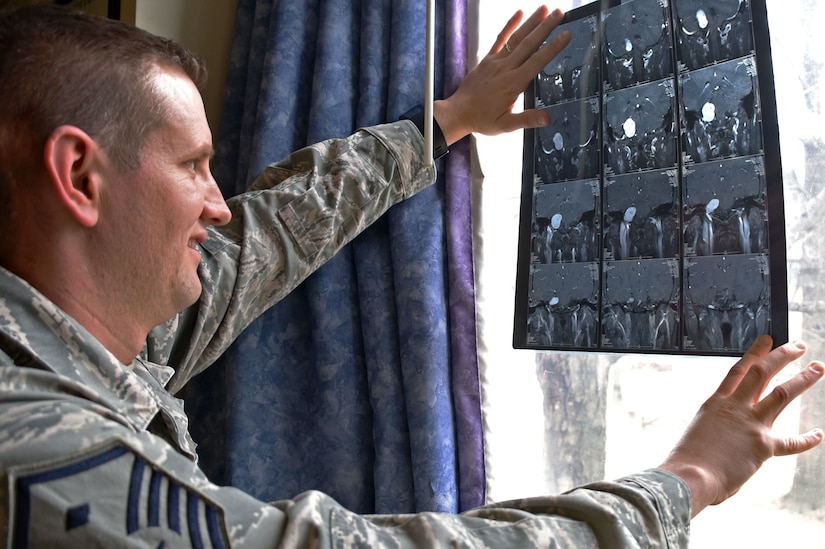By Air Force Tech. Sgt. Veronica Pierce, 70th Intelligence,
Surveillance and Reconnaissance Wing
FORT MEADE, Md. -- Over 10 years ago, while stationed in
Hawaii, Air Force Master Sgt. Geoffrey VanDyck had the constant feeling of
water in his ear. He knew something was wrong.
Nothing seemed to relieve the feeling, so his medical
provider sent him to an ear, nose and throat specialist. The cause of his pain
and discomfort was found: a golf ball-sized tumor -- an acoustic neuroma.
According to the Mayo Clinic, acoustic neuroma is a
noncancerous, usually slow-growing tumor that develops on the main vestibular
nerve leading from the inner ear to the brain. In some cases, it can grow
rapidly, pressing against the brain and interfering with vital functions.
In VanDyck’s case, radiation was not an option, so surgery
was necessary.
Choosing Surgery
The tumor was located close to VanDyck’s spinal cord, so his
doctor gave him two choices: have surgery to remove the tumor and have a 1
percent chance of hearing again or let the tumor continue to grow and have a
100 percent chance of becoming a quadriplegic within a year.
“I did the quick math and said OK, let’s lose the hearing,”
VanDyck said.
Concurrently, it was VanDyck’s turn for a permanent change
of station. The surgery was scheduled in San Antonio, while he was en route to
his next duty station. The timing of the surgery would leave him separated from
his family for months, providing him no support network during and after the
surgery.
“When I was diagnosed, I had orders to Arizona,” VanDyck
said. Doctors said he could be flown to San Antonio for the surgery and fly
back and forth every other week for follow-up, but VanDyck knew there had to be
another option.
That was when he went to his first sergeant in Hawaii for
assistance.
The first sergeant worked through the career field
functional manager to get his orders changed to an assignment in San Antonio.
There, he could have the surgery and his family would be close by to help him
recover.
Recovery
After surgery, VanDyck took four months of convalescent
leave for recovery and physical therapy, he said. He lost hearing in his right
ear permanently and had to rebalance his body.
“Even sitting up was difficult,” he said. “I would get
completely sick and turn pale.”
VanDyck completed extensive physical therapy to learn how to
walk, sit up and live life independently again.
“I didn’t know how amazing the body could be,” he said.
Through it all, VanDyck appreciated his first sergeant and
the Air Force for allowing his family to be with him.
“I honestly don’t know where I would have been if my family
was not there,” he said. “For the first month I couldn’t drive, walk, shower or
even live independently.”
VanDyck recalled one of the first times going out in public
after his surgery. His family had taken him out to dinner at a local
restaurant.
“The ability to process sound is something we take for
granted,” he said. “I have no directionality and I also cannot filter out
sound.” At the busy restaurant, so much was going on around him that it became
overwhelming and his brain wasn’t able to filter out all the sounds. It was at
that point that he broke down, felt the loss of his independence and started
lashing out, he said.
Making Changes
One day, when his wife sat him down and confronted him about
it, he realized how much he needed his family’s help to recover. With the loss
of hearing, there were changes that he had to make in his daily life and things
he had to become more aware of.
“From where I sit at a table to which side I walk on,
whether I’m too close or too far back from someone, I had to take those things
into consideration,” he said.
Now, more than 10 years since the diagnosis, VanDyck is now
a first sergeant for the 707th Force Support Squadron, and his experiences are
giving him an avenue to help airmen during times of need.
“Since becoming a first sergeant I have expanded my
knowledge on various tools and resources, and how those rely on the Air Force
Instructions, and what rules we have to take care of people,” VanDyck said.
Now, he can use his knowledge and personal experience to
help others identify issues and find solutions.
“One of the most difficult hurdles to overcome is to admit
something was wrong,” VanDyck said. “To airmen facing personal challenges, the
advice I have is: recognize when you are struggling and face the situation
head-on. You can’t just ignore a problem. You’re going to have to face it, but
you don’t have to do it alone.”









No comments:
Post a Comment